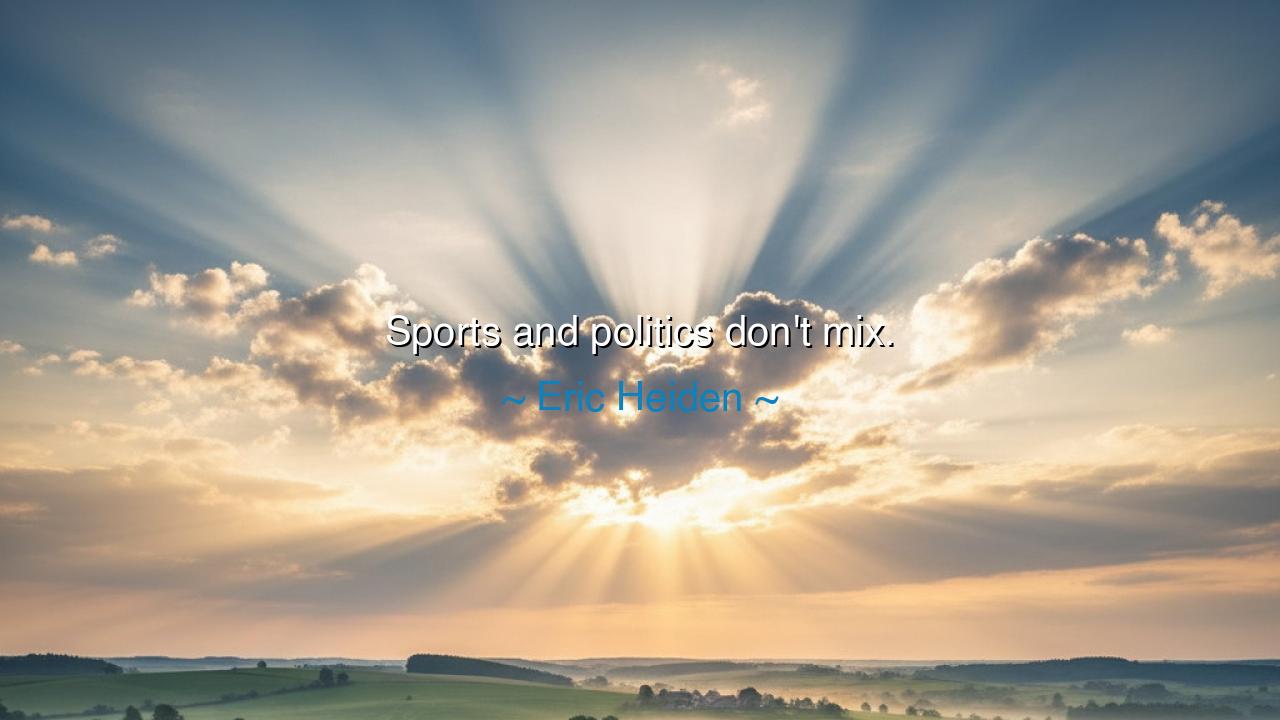
Sports and politics don't mix.






When Eric Heiden declared, “Sports and politics don’t mix,” he gave voice to a longing that has existed since the dawn of competition: that the playing field should be a sanctuary, untainted by the quarrels of rulers and the divisions of nations. His words suggest that the essence of sports lies in purity—an arena where merit, discipline, and courage decide the outcome, not ideology or power. In saying this, Heiden pointed to the dream of a realm where human excellence can be celebrated for itself, untouched by the heavy chains of politics.
The ancients themselves dreamed of such a separation. In Greece, when the Olympic Games were held, a sacred truce was declared across warring states. Armies laid down their weapons, and enemies walked as neighbors, united in the spectacle of human strength and honor. For a brief season, the divisions of the world were set aside, and the field of play became a temple of unity. This is the spirit behind Heiden’s words: that sport should not be weaponized for power, but preserved as a realm where all may stand equal.
Yet history teaches us that the two—sports and politics—are often intertwined. The 1936 Berlin Olympics, overshadowed by the shadow of tyranny, sought to glorify an empire’s ideology. And yet, it was there that Jesse Owens, an African American runner, defied both Nazi propaganda and the prejudice of his own homeland by winning four gold medals. In that moment, the purity of sport struck a blow against political oppression, showing both the danger and the power of their entanglement.
When Heiden spoke, he did so as an athlete who knew the sacredness of preparation and competition. For the skater who trains endlessly on ice, or the runner who labors upon the track, there is no politics in the rhythm of the breath, the strain of the muscle, the battle against time. The athlete’s world is built upon discipline and desire, not upon the decrees of governments. In this way, his statement is both a plea and a shield: a plea to keep the field of play unsullied, and a shield to protect the athlete from being used as a pawn in battles not their own.
And yet, there is a paradox. For while Heiden proclaims that sports and politics don’t mix, the world often looks to athletes as symbols of hope, resistance, or unity. From Muhammad Ali refusing military service, to South Africa’s rugby team uniting a divided nation after apartheid, we see again and again that sport cannot be entirely separated from the tides of history. The athlete may wish only to compete, but the world watches with eyes that see more than the game.
The lesson for us, then, is twofold. First, honor the spirit of Heiden’s wisdom: let sport remain a place where excellence, fairness, and unity can flourish without being poisoned by ideology. Celebrate the purity of play, the joy of competition, the fellowship of rivals. But second, be aware that sport will always carry echoes beyond the arena, and when it does, let it be used not for division, but for justice, healing, and peace.
Practically, this means watching and playing sports with the right spirit. Do not reduce them to political arguments or tribal hatreds; see them instead as bridges between people, as living examples of discipline and joy. And when politics enters, as it sometimes must, strive to ensure it elevates rather than corrupts, unites rather than divides. For the true power of sport lies not in who wins or loses, but in its ability to remind us of our shared humanity.
Thus, Eric Heiden’s words endure: “Sports and politics don’t mix.” They are a call to guard the purity of the arena, to remember that in the clash of competition we glimpse something beyond power—the striving of the human spirit. And while the world may always attempt to mix the two, we must fight to preserve the soul of sport as a light for all people, across every nation and creed.






AAdministratorAdministrator
Welcome, honored guests. Please leave a comment, we will respond soon